#considering there is like. No People Of Central Asia that has a caste of dancing and naked earth-priestesses it's not a matter of because
Explore tagged Tumblr posts
Note
Consider re: herb brides, because of the rituals and nature around ripping and tearing seams and fabric what if like “very nice” or formal ware was styled around clothing that CAN’T rip? Either very very thick and sturdy material OR like loophole designs…. Dresses and tunics woven out of like layers of cords draped over the body?
the whole of the herb brides' Things is that the uncovering of the body is the point, you have this line in p1 of a dancer saying "The body is sacred. The naked body is the most accurate image of the world." so the uncovering/the tearing/the ripping appears as like the point [one of the points] of the capital-d-Dance ("Why do you strip your sacred body naked?"/"Because I know the Dance and have the right to do so."). it's interesting thinking about material that Can't rip because it'd be like... a test of strength and of fortitude, almost. "how passionately are you willing to dance in order to make this un-rippable material, rip?" type of thing. in the same way they are forbidden from wearing shoes because the tippytapping of their steps/connection of their bare footsies to the earth is thought to be the one thing that brings the harvest i wonder what would be the #consensus on what they can wear. but also a sturdier/thicker material would make it harder for them to dance, and their whole point is that they dance, but referring to what i mentioned above maybe it's a test of sorts... it's kinda how i see the herb maidens [lore i made the fuck up] the many layers is a burden for them to prove they Can dance but they shed them during adulthood. many things to consider!
#it is inchresting to think abt HB's fits & approach to clothing as there is not really any ''we need to respect their cultures'' argument#considering there is like. No People Of Central Asia that has a caste of dancing and naked earth-priestesses it's not a matter of because#on the herb brides' nakedness not as women who like. chose this. or a factual representation of an indigenous culture#because that's fully some guy's invention. have talked about it at length.#i'm never as bothered by their flimsy clothing and nudity as i am by their treatment as women; naked women; naked indigenous women#so i'm not bothered by the ripping and tearing. & i think within the fictional Kin culture it makes sense they'd wear clothes that#rip and tear because they're proof of the passion of the capital d Dance. but also. it's fun + makes you hashtag Think that some would wear#would want to wear/would be made to wear heavier garments as like. a test. because imo that's all it could be.#i have heavier garments within my Made The Fuck Up herb brides lore for the herb maidens [mentioned in the reply] & for the herb crones#maidens because they're in a initiation/proof period & crones because they get old & chilly. much to think about.#herb brides lore#herb fledglings#herb maidens#herb crones#<- i've discussed it
13 notes
·
View notes
Text
The Top 25 Films of 2019

25: Shadow (dir. Zhang Yimou)
"Without the real, there can be no shadow. A principle no one's understood."
After a string of terrible films trying to play to Hollywood audiences, Zhang Yimou manages to successfully return to the goldmine he stuck in the early 2000s and craft another absolutely gorgeous wuxia. Here he swaps out the poetic, colorful beauty in favor of monochromatic, surprisingly violent tone poem about deceit. It ultimately works against it, as by the seventh or eighth double cross you kind of just give up trying to figure out who's on what side, but the main action setpiece is so wonderful it deserves a spot for that alone. Hopefully a good sign for Yimou's future, as long as we don't have another nationalist war epic that somehow inexplicably also has a white savior narrative too.
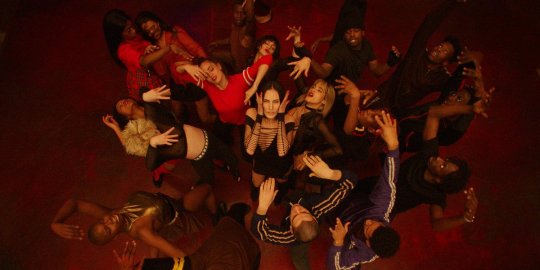
24: Climax (dir. Gaspar Noé)
"...something's kicking in..."
Noe takes us for another plunge into the dark, twisted, vomit-inducing, neon-lit hellscape that is his mind and at least has the common courtesy to put the pleasant parts upfront this time. While it will eventually devolve into the same type of chaos that we all love/hate from him, the first act is kind of a wonderful departure from him. He basically accidently makes a musical for a while, with wonderful and deeply intricate dance choreography as well as a fantastic extended sequence where every character jumps in and out of frame and gets a chance to strut their stuff. That movie would have been a strong top five contender, but alas, the man has his particular quirks that he must abide by. But at least he also strung together probably the best soundtrack and sound design of the year, with the fantastic EDM bangers rumbling through the walls throughout the entirety of the film.
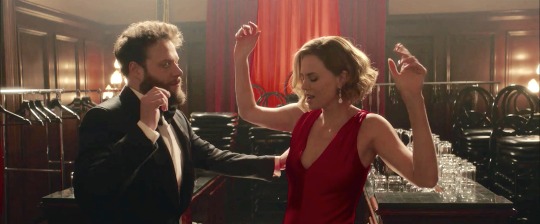
23: Long Shot (dir. Jonathon Levine)
"Oohhh boooy!"
Charlize Theron and Seth Rogen doing a political comedy that manages to be both smart and extremely funny seems like a long shot indeed, but Johnathon Levine finally strikes gold again after a number of disappointing duds. He manages to make a pretty good story about how navigating the political minefield destroys what little hope and dreams high level politicians still manage to have, but then he also happens to make it all absolutely hilarious too. Theron demonstrates a surprisingly strong comic game too, easily matching all the other talent and cracking jokes along with them. It ends up being a charming romance where the woman takes charge in a very pleasant change of pace. And if nothing else, the way Seth Rogen yells "oh boy" in that video is always going to make me laugh no matter what.

22: 6 Underground (dir. Michael Bay)
"Ghosts have one power above all others: to haunt the living. Haunt them... for what they've done."
Theoretical question: what say Netflix gave Michael Bay a blank check and no restrictions, and he turned in the most overblown, dialed to eleven, nonsensical spectacle that he ever crafted and was allowed to put it into almost every American home for free? Now what if I told you that it was actually kind of awesome? Sure, it's basically a child playing with his $150 million dollar GI Joe set, smashing his toys together and making pew-pew sounds, but it's also probably the best testament to the power of conventional effects work over the increasing insistence on CGI for big setpieces. Let's face it: explosions are pretty cool, every one likes exotic locales and bright sports cars, and there's at least someone here to appeal to you (least surprisingly for me, it was Melanie Laurent with bangs wearing a suit). It almost reaches a late Michael Mann kind of abstraction, as both are respectively breaking apart the action movie into stranger combinations. Bay gives plot only because he contractually has to, and even then doesn't seem as committed to characterization as he is showcasing surprisingly brutal ways for the gang to dispatch their enemies. It's nonsense, but the damn best nonsense of the year.
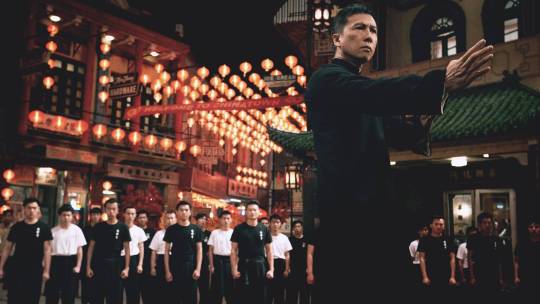
21: Ip Man 4: The Finale (dir. Wilson Yip)
"Is that it?! Is this your Chinese Kung Fu?!"
The finale in the decade-long quadrilogy of supremely silly and borderline racist worship of China finally attempts to tackle America to delightfully amusing results. Scott Adkins doing his best evil R. Lee Ermey impression while slipping in modern neo-con punchlines, neverending Bruce Lee worship, and more nationalism and bad fake American accents than you could ever believe. Yet also a more bizarrely honest portrayal of racism in 1960s America than most movies would ever have the courage to acknowledge. It’s almost fascinating considering how a lot of the non-Asian racism basically serves as set dressing, but they still put more effort there than pretty much every Hollywood movie set in the 60s that isn’t directly about civil rights. But ultimately they're selling you a bill of goods saying "watch Ip Man beat the crap out of racist meatheads" and you better believe they're going to give you what you want.
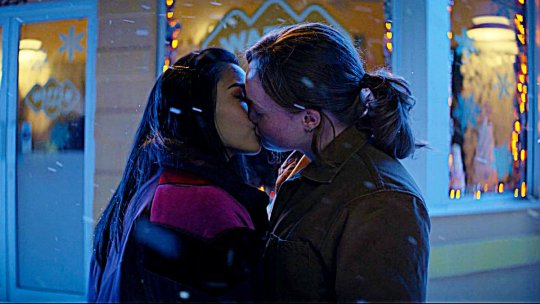
20: Let It Snow (dir. Luke Snellin)
"Have you ever been with someone, and you stay up until like 4AM just talking about everything, and you're just like, I can't believe I get to exist at the same time as you?"
Okay, so let me explain myself on this one:
So yeah, it certainly is a generic teen romcom where everyone plays into basic teenage stereotypes, half the cast is clearly nowhere near eighteen, and all of the romance is oddly chaste. But there truly is something to be said about representation in a romcom, and after a thousand boring cis, straight, hetero couples falling in love for decades, this movie actually managed to hit a lot of notes that are at best rarely explored in the genre and also manages to probably sneak in some genuine firsts. While both the "tomboy/softboy" and "Latina struggling with her family" storylines have been done before, these are some nice, cute little iterations on those befitting a teen-friendly movie. But the Dorrie/Kerry story is not only legitimately groundbreaking, but also an absolutely perfect encapsulation of the types of problems that queer teenagers struggle with during that time of their lives. It's a queer romance, played by two actually not-straight people, with one of them being a nonbinary actor too. And it's not cordoned off into some bargain bin DIY indie that fell out the back of the truck on the way to an indie film festival; no, this is in a major holiday release, with well-known actors, and as one of the central storylines! Plus, it perfectly captures the woes of modern teen coming out, knowing that everything will probably still be cool, but the fear haunting you as all you can do is look jealously at someone who is out and proud. And it does it without being real shitty and horribly traumatic too. Eat your fucking heart out, Love, Simon!

19. John Wick: Chapter 3 -- Parabellum (dir. Chad Stahelski)
"Si vis pacem, para bellum!"
Another year, another John Wick movie. There's more plot; you don't care, and let's be honest, neither do I. Stahelski is here to serve up more badass characters and incredible action, and no one in Hollywood does it quite like him. It's got familiar action favorites demonstrating why they still remain supreme, with Yayan Ruhian, Cecep Arif Rahman, Tiger Chen, and the ever underrated Mark Dascascos. It's got surprising action showcases for Halle Berry, Lance Reddick, and somehow Boban Marjanović. It's got great character actors doing their thing, from the returning McShane and Fishburne to newcomers Saïd Taghmaoui and Anjelica Huston. It's got Asia Kate Dillon as an awesome nonbinary shadow organization asshole. It has a bewildering Jason Mantzoukas cameo. And above all else, it has Keanu Reeves, still demonstrating not only his incredible physical skill, but also how to perfectly utilize his particular acting style to create an iconic character.
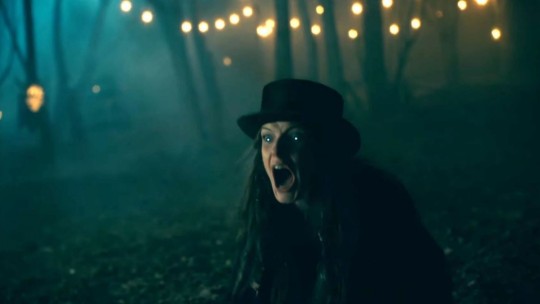
18. Doctor Sleep (dir. Mike Flanagan)
"Man takes a drink. A drink takes the drink. And then the drink takes a man."
While not the most accurate adaption, it might be the only Stephen King adaptation that comes to mind that actually successfully channels what makes him such an appealing author. King's stories have an inherent corniness to them and for as much as you unsuccessfully try to cover that up (look to this year's The Outsider for a good example), it's where the true charm of his work shines. It's what makes this so fun, because as much as an epic, eldritch terror is exciting, it still doesn't have the goofy fun of a bunch of vampiric bohemian drifters led by a Stevie Knicks knockoff in a top hat breathing up souls. Plus, the epic three hour runtime actually allows Flanagan to at least try to cover all the more subtle serious characterizations of Danny Torrance, from his recurring alcoholism to him seeking closure with regards to his parents. It manages to actually make the final act's nostalgia play kind of work, or at the very least get the terrible memory of the Ready Player One version out of my head.
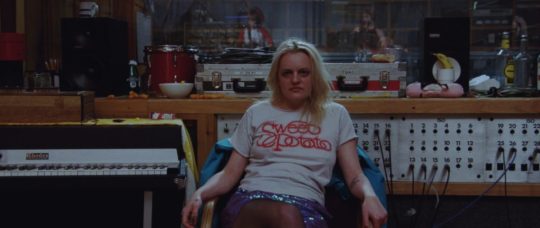
17. Her Smell (dir. Alex Ross Perry)
"I thought you were better than this, but deep down I knew you weren't."
Perry must have had some extra pent-up nastiness in him after having to restrain himself while writing Christopher Robin (by the way, that happened), because he really created one of the nastiest characters in cinema here. Her Smell is the equivalent of being locked in a room with the shittiest person you'll ever meet, as she constant lashes out at everyone and everything with the kind of delirium that the truly demented are cursed with. And credit to Elizabeth Moss where it's due: she really perfectly embodies such a horrible human being and proceeds beat you damn near to death with it during a majority of the runtime. Eventually it slows down and all of the problems become apparent once they script isn't flying by at a thousand words a minute. But Moss literally did her job so well that people fucking hate this movie because of her character, and if that isn't a testament to her acting talent than I don't know what is.

16. High Life (dir. Claire Denis)
"At 99% the speed of light, the entire sky converged before our eyes. This sensation, moving backwards even though we're moving forwards, getting further from what's getting nearer. Sometimes I just can't stand it."
Denis finally makes her English debut with what she does best: nauseatingly uncomfortable sexuality oozing from terrible people doing horrible things. In this case, she takes an innovative detour into sci-fi, setting up a decades-long story of human experimentation, murder, the horrors of space travel, and whatever unholy things are going on inside of the "Fuck Box". It has an appropriately dingy production design too; the clean retro-futurist spaceship design soon dissolves into a torn apart den of depravity, caked in a mixture of filth and dry blood. Pattinson once again manages to be likeable while also being extremely standoff-ish; only playing with his baby daughter do we seem to see him actually enjoy interacting with a human being. Kind of gets lost in the sauce near the end, but at least manages to land some surprising emotional notes considering the kind of horrors that they've shown up until then.
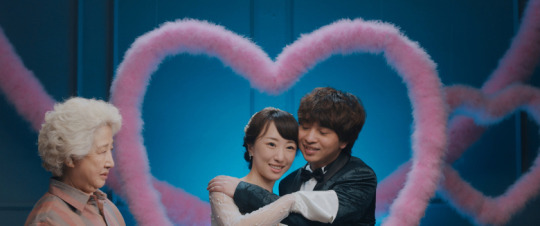
15. The Farewell (dir. Lulu Wang)
"Chinese people have saying: when people get cancer they die. It's not cancer that kills them, it's the fear."
Lulu Wang's followup to Posthumous is such a massive step up in talent it's not even funny. She manages to make such a wonderfully soulful and loving movie about impending death by utilizing near perfect comic timing to defuse a situation that threatens to stray too dark. Not to mention her point of view on modern China from a non state-sponsored eye actually captures a much more accurate shot of the country itself. It's almost as if an Edward Yang movie had set itself more modest expectations -- it's pleasant, goes down well, teaches you a couple of things about Chinese culture, and manages to do it all in only a hundred minutes. And Awkwafina manages to hold her own against far more experienced actors, even if you can tell her Mandarin is still a little spotty.
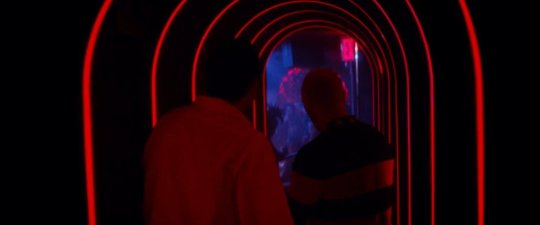
14. Uncut Gems (dir. Josh and Benny Safdie)
"I think you are the most annoying person I have ever met. I hate being with you, I hate looking at you... And if I had my way I would never see you again."
Adam Sandler's magnum opus performance -- there will never be another character that fully embraces every grating aspect of his style of acting and manages to weaponize them for two anxiety-inducing hours of hell. Sandler's Howard Ratner is an absolute sewer rat scumbag, an untrustworthy coward, and a perennial fuck-up of epic proportions. But he's still so charismatic and powerful on screen that you root for him every time he drives you further up the wall. And the Safdie brothers know how to keep him moving too, never letting the audience catch a breath of air for this movie-length panic attack as the odds stack further against Howard each minute. Whenever you see Sandler phoning in his comedies for fat checks, just remember this performance and how pretty much every awards committee completely ignored this film. No wonder he doesn't bother trying anymore.
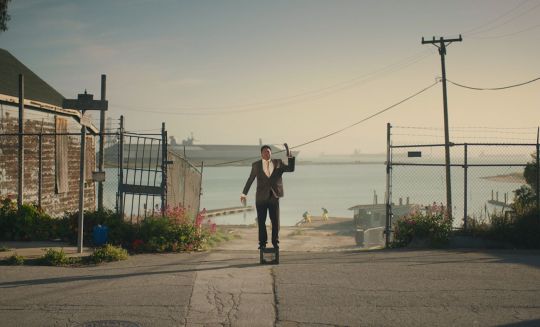
13. The Last Black Man In San Francisco (dir. Joe Talbot)
"You don't get to hate it unless you love it."
A wonderfully evocative love letter to a changing city that is so full of life in every way, from the vibrant movement of the camerawork to the bombastic and powerful soundtrack blasting throughout. But it actually plays more like a New Orleans' funeral march, a melancholic chronicle of the original denizens of San Francisco even as the city warps into the caricature that it's slowly becoming. There is a definite feeling that the aggressive gentrification is unavoidable and even the love of the original quirky denizens can only stave off the metaphorical steamroller that paves over the past. It makes for a wonderful counterpoint to the previous year's Blindspotting: both about young black men dealing with gentrification in the Bay Area, but Blindspotting starts as a very angry comic satire that eventually ends on a note of hope and a will to survive the changing tide, whereas this begins as a joyous celebration of the city and ends on a heartbreaking resignation in the face of everything. Both come from respectively very different sides of San Fran culture, but it's rather interesting seeing each have such different approaches to the same topic.
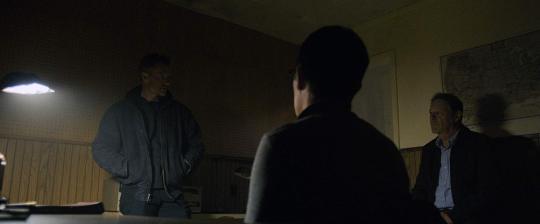
12. The Standoff at Sparrow Creek (dir. Henry Dunham)
"How do we know it's not you?"
A simple "pressure cooker" scenario done to perfection: one empty warehouse, a bunch of hardened standoff-ish militia men, a missing gun, a ticking clock, and a whole lot of suspicious side eyes and probing questions. It helps that the gruff suspects are a perfect who's who of roughened character actors, all previously well-versed in playing suspicious people, and all of them hiding the kind of unspoken rage that makes a man secretly join an armed militia. All of this told with a nerve-wracking minimalism and style as weirdly detached from reality as some of these men are. One hell of a debut for Henry Dunham and hopefully a sign of good things to come.

11. Booksmart (dir. Olivia Wilde)
"How about we play a *rousing* round of J'ACCUSE!"
Profoundly silly and yet also so disarmingly sweet, Olivia Wilde whips a wildly stylized portrait of Gen Z high-schoolers and the many ways that they vastly differ from their older peers. Certainly much more welcoming and accepting of the diversity of teenagers than pretty much any other teen movies from the past, although they still poke fun at some particular brands of modern "wokeness" too. Stuffed to the brim with wonderfully weird characters, between the lovable catty theatre duo of George and Alan, the cringe-inducing desperate rich kid Jared, the endearingly dumb thirstball Theo, the dorky and blissfully unaware queer-bait Ryan, the effortlessly cool and extremely "top energy" Hope, and the absolutely batshit wildness that is Gigi. But mainly it serves as a vehicle for Devers and Feldstein, with both bouncing perfectly back and forth off each other in moments of comedy and drama. Feldstein always pulls off huge laughs pretty much every line and Devers sells a perfect amount of baby-gay awkwardness in one of the sweetest (and heartbreaking) queer romance stories in film. But above all else, it's just so damn fun and aware of what teenagers are actually like than most movies ever have been.
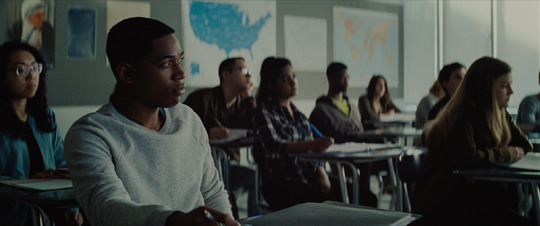
10. Luce (dir. Julius Onah)
*chuckles* "You really think I believe that stuff?"
One of the most wildly uncomfortable experiences in recent cinema history, but not due to any horrifyingly explicit graphic content being shoved in our faces. No, Onah and Lee created something much more discomforting: a constant challenging of all our biases and stereotypes, of us wanting to give chances and have faith in those that we trust. Kelvin Harrison Jr. delivers one of the best acting performances in recent memory because he's able to literally do everything; his Luce somehow manages to perfectly walk the tightrope required for a performance like his. With him behind it, Luce is such a charming, loving, likeable character but there's always just something that seems off about him. And even if Spencer's Wilson has a fixation on him that crosses all sorts of legal and moral boundaries, wouldn't we be cheering her on under different circumstances? In a way, she herself is trying to communicate a lesson about perception too, one that also mires in deep, troubling waters. Even if the film still feels very stage-y due to it's source material, the cold clinical aesthetic only further helps it make us squirm in our seats.
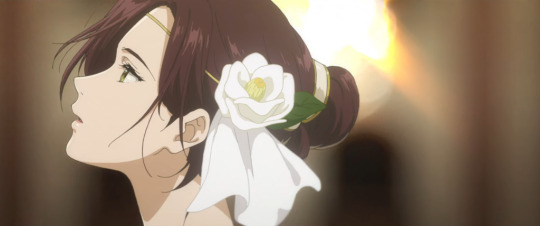
9. Violet Evergarden: Eternity and the Auto Memory Doll (dir. Haruka Fujita)
"Nobody wants a letter that cannot be delivered."
An absolutely magical experience that artistically excels over the original TV series it's based off of. The production is still as impressive as any other KyoAni work, but the composition and lighting in particular are outstanding, selling the social isolation of the first half and the childlike wonder of the second half. Beginning with a sublime Victorian romance in the first half, the story eventually morphs into a tribute to the workers of the world, the cogs in the machine. But in the context of the studio's recent history and the horrific arson attack that claimed 36 members of the studio, this instead comes off as a battlecry against the opposition against them. It's a story valuing those who are overlooked in the process of creation, a story about strong determined women, a story of a young girl defining her own future against society. KyoAni as a studio were most known for treating all their employees exceptionally as well as being a primarily female-led studio, both unfortunate exceptions in the industry as well as the target for a lot of unfair online hatred against them (and surely played some sort of role in why the arson attack happened to them specifically). To see the studio make their first post-attack work so proudly emblematic of what made them unique makes this so much more powerful than you would expect.
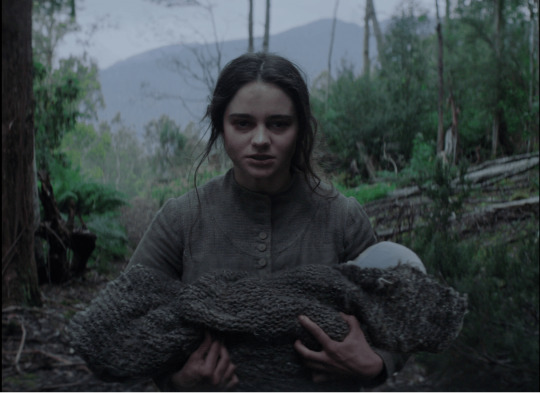
8. The Nightengale (dir. Jennifer Kent)
"You know what it's like to have a white fella take everything that you have, don't ya?"
The classic revenge fantasy narrative warped into a bleak, cynical portrait of racist cruelty in 1800s Tasmania. Jennifer Kent, improving leaps and bounds from the relatively straightforward Babadook, crafts a searing indictment of the foundations of colonialism and the misogynistic undercurrent of the barbarous society. It's a revenge movie where the vengeance is horrible and unsatisfying -- there's no crowd pleasing murderous money-shots, just brief moments of comeuppance in the face of everything in the world working against our two protagonists. Those who are squeamish should be aware that it is exceptionally graphic and grueling at times, although Kent does manage to keep up a very good pace for the two and a half hours of hell.
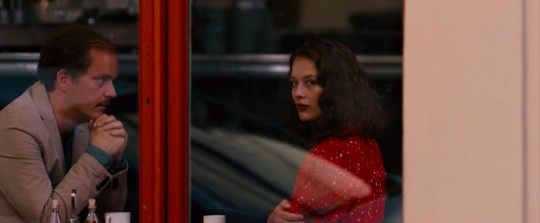
7. Transit (dir. Christian Petzold)
"They say that those who were left never forget. But it's not true. They have the sweet, sad songs. Pity is with them. Those who leave, no one is with them. They have no songs."
Hitchcock by way of Kafka -- a classic existential mystery told in a disorienting separate reality not quite like our own. It's a bold move to take a Holocaust set narrative and completely throw out the actual setting itself, but Petzold only enhances the weird themes of the story by taking it to a completely different but still very familiar time. This is a classic tale of becoming the person you say you are but really aren't -- then begging the question of what if you're not the only one also living a false identity. Buoyed by an excellent and very enigmatic lead performance from Franz Rogowski, who displays a tremendous skill for playing somebody so closed off but also very charismatic and watchable.
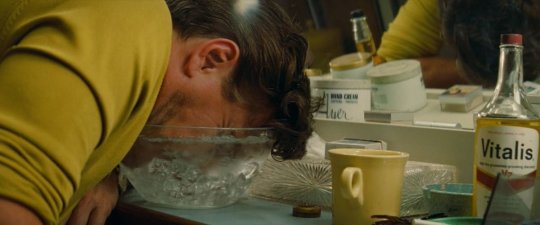
6. Once Upon a Time... in Hollywood (dir. Quentin Tarantino)
"When you come to the end of the line, with a buddy who is more than a brother and a little less than a wife, getting blind drunk together is really the only way to say farewell."
Tarantino trades in his B-movie worship and penchant for comical bloodbaths (well, for the most part) to make something I certainly didn't expect from him: a relaxed hangout movie about getting old and falling out of fashion. Exceptional production design whisks us away to the height of Hollywood and three different people all looking at their future careers in very different lights. Leo gets to stretch his wings in all sorts of silly fun ways and Brad Pitt finally lets go of the young superstar image and easily slips into his more natural "hot single dad" swagger, playing the most effortlessly cool character of his career. Tarantino sets aside time to look back on his own flaws as well and playfully reflects on his own particular ...quirks. Easily his best since his 90s prime and the first time in a long time I've felt the maturity that he showcased in Jackie Brown.
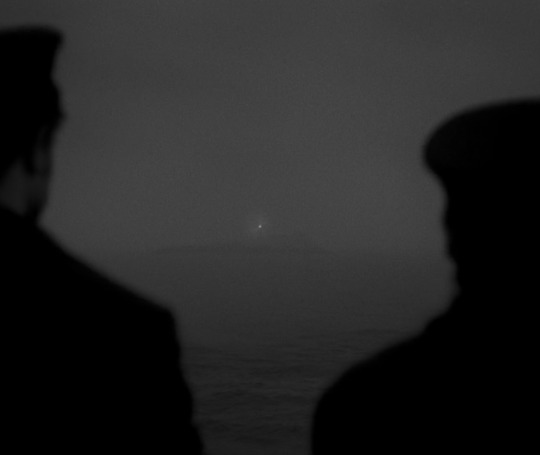
5. The Lighthouse (dir. Robert Eggers)
"Damn ye! Let Neptune strike ye dead Winslow! HAAARK!"
Hyper-masculine mania as told through a wonderful blend of dark comedy and cosmic horror and with some of the most lush black-and-white cinematography maybe ever in a film. Eggers' now trademark devotion to absolute accurate period detail in both visual design and dialogue greatly helps this reach transcendent heights. But it's truly the two performances of Dafoe and Pattinson that help it weave a perfect spiral of insanity that also manages to be so oddly fun. Never could there be any other paring of actors that would perfectly showcase these two dirty sea-dogs going stark raving mad at each other so well.
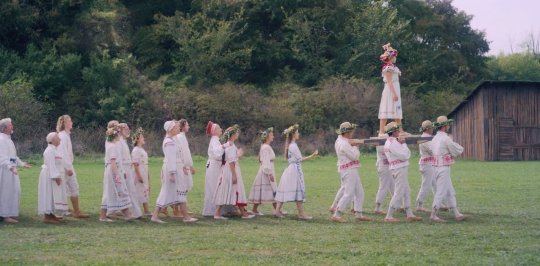
4. Midsommar (dir. Ari Aster)
"As Hårga takes, so Hårga also gives."
(Director's Cut) Every generation deserves their own paranoia-fueled pagan horrorshow, but Aster strikes a much deeper vein in his epic take on the classic territory The Wicker Man had previously claimed. The brutal rituals of the Hårga are only set dressing most of the time, with much more focus poured into the vile toxicity plaguing the relationship between students Dani and Christian. Reynor's Christian is such a perfect portrayal of a terrible influence -- he's charming, fun, and likeable when he's on your side, but the second anybody goes against him his seedy manipulation begins to seep into everything he says. Pugh continues her winning streak too, delivering a broken person desperately trying to put a smile on while falling apart on the inside as she realizes she truly is all alone in the world. While some might be disappointed by the lack of actual "terror" for a good chunk of the movie, Aster has found something much more likely to scar us than these friendly Swedish cultists.
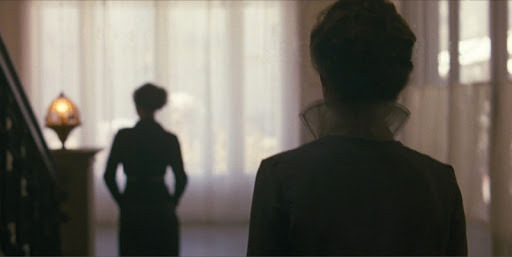
3. Sunset (dir. László Nemes)
"The horror of the world hides behind these infinitely pretty things."
After striking gold with Son of Saul, Laszlo Nemes takes a hard turn into a very different genre but manages to create a wonderfully unique spin on classic detective noir. His signature camerawork powers this yarn, successfully taking the claustrophobic eye of Saul and using it to give a truly immersive sense of place in the tumultuous world of 1913 Budapest, where danger is simmering under the surface and ready to boil over at any moment. After all, noir is always about the eye of the detective, so Nemes' style takes it to a literal degree where everything outside of Irisz' field of vision is incomprehensible. We catch the same shady sideways glances and hushed whispers at the same time she does too. The plotting, like all noir tales, gets a little too complex for its own good, although it's less because of double-crossing and deceit and more from the story slowly dropping its connection to reality to function on a far more allegorical level. But as far as immersive, experiential cinema goes, not even 1917 can stack up to this film's highs, as the enraged lower-class populace eventually comes for the heads of the bourgeoise and Irisz suddenly realizes she is in the very wrong place at the very wrong time.
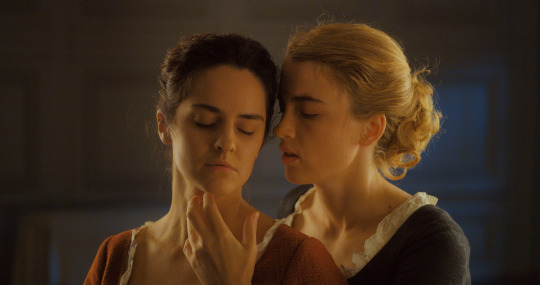
2. Portrait of a Lady on Fire (dir. Céline Sciamma)
"Do all lovers feel they're inventing something?"
An absolutely breathtaking portrait (hehe) of yearning and love, so astonishingly romantic and actually aware of what will make a woman swoon. Every technical aspect is perfect, from the gorgeous locale to the lovely windswept dresses to the soft, classical cinematography. But the true magic comes from Merlant and Haenel perfectly delivering every line of Sciamma's wonderous script. Those two have a sexual tension strong enough to burn down the theater, as their shy glances turn into deep longing stares and both their steely professional reserves give way to poorly suppressed joy at just being able to be with the other. Even their initial terse dialogue melts into pure romantic splendor, as they lovingly catalog all the little gestures the other does when flustered. Their connection during filming was powerful enough to fuel rumors around the two in the press and is currently providing the desire for every thirsty lesbian who finishes this to immediately pull up videos from the press tour and hunt for those same things between the actors themselves. And trust me, they are there.

1. Parasite (dir. Bong Joon-ho)
"Not 'rich but still nice.' Nice because she's rich, you know? Hell, if I had all this money, I'd be nice too!"
Very rarely does a film come along that actually warrants to be described as "perfect", as in one that literally generates no critiques in any way even if I was forced to pick something at gunpoint to complain about. But Parasite truly does every single thing right. Even Bong's tonal whiplash style, which does grate on me at times, somehow fits perfectly here as the schemes become increasingly madcap and the increasing sense that this will all come crashing down horribly mounts ever higher. Until then, it's an absolute joy to watch in every way, as Bong stacks the card deck higher and all the characters dive further into the sewer for their own benefit. The midpoint pivot works wonderfully too, as it goes to show that literally every person is getting played in the world of Parasite. It's massive success is only surprising to those who haven't seen it: it's the perfect movie for the era it came out in and may as well be the watershed moment for a new age of cinema where Hollywood finally admits that it's not the king of the world anymore.
#top 25#2019 in film#parasite#portrait of a lady on fire#sunset#midsommar#lighthouse#fuck capitalism
1 note
·
View note
Text
Mizoram Travelogue

The primeval Mizoram is the heaven to explore as it is a journey of unforgettable experiences and not just the place to visit. The localities share many things in common with locals in neighboring countries of Southeast Asia and religion with high predominance in Mizoram is Christianity. The culture in Mizoram is highly liberated from gender or caste.
Contents [hide]
1 Culture of Mizoram
2 Environment at Mizoram
3 Climate of Mizoram
4 Festivals of Mizoram
5 Sightseeing in Mizoram
6 Shopping Expedition in Mizoram
7 Delectable Dishes of Mizoram
8 Facts and Figures About Mizoram
9 Map of Mizoram
4.1 Thalfavang Kut
4.2 Anthurium Festival
4.3 Khuado Hut
5.1 Tamdil Lake
5.2 Blue Mountain
5.3 Murlen National Park
5.4 Salvation Army Temple
5.5 KV Paradise
6.1 Millenium Centre
6.2 Bara Bazar
7.1 Bamboo Fry
7.2 Koat Pitha
7.3 Paanch Phoran Tarka
7.4 Bai
8.1 Facts About Government of Mizoram
8.2 Facts About state symbols
8.3 By Air
8.4 By Train
8.5 By Road
8.0.1 Wildlife sanctuaries in Mizoram
Culture of Mizoram
The colorful dress code, musical festivals, and bamboo dance are the cultural aspects that make Mizoram a must visit destination. The major communities of Tibeto-Burman communities comprise of Kuki tribal groups like Pawi, Lushai, Zou, Ralte, and Hmar. They prefer to be entitled as Mizo with the feeling of togetherness. The commonly used language amongst the tribes is Mizo Tawng. Kuki was used to address the Frontier Highlanders by Bengali people in the neighborhood plains.
Environment at Mizoram
The largest forest coverage area in India and there are tropical forests all around the Mizoram. The major part of this state is shielded with bamboo forests and because of the dense forest, it was explored by British at the last. Mizoram is blissful as it is not only rich in scenic beauty but in biodiversity and natural resources as well. This state has most of the wildlife sanctuaries and the forest is the midway for animals to migrate between hills and plains.
Climate of Mizoram
Mizoram is situated below Tropic of Cancer so there is subtropical climate. The high altitudes aids in relishing the pleasant weather whole year. Due to heavy forest coverage, this place experience excess of rainfall starting from May till September. Days in winter are soothing but night are unbearably cold. The maximum temperature of Mizoram is 35degree Celsius and the minimum is 5degree Celsius.
The best time to reconnoiter Mizoram is October to April because at this time the sky is clear are the weather is pleasant.
Festivals of Mizoram
Thalfavang Kut
The auspicious festival celebrated every year in November, to preserve cultural heritage and for promoting tourism. As cultivation is the major source of livelihood, this festival is celebrated by farmers at the waiting period for harvesting. This festival is celebrated to get in touch with tourist and make them known to the culture and tradition of the state and let them take pleasure in the lifestyle of Mizoram.
Anthurium Festival
Horticulture department and Tourism department collaboratively organize this festival. The support in terms of finance is received from Central Government. The purpose of celebrating this festival is for promoting tourism by engaging their attention towards mesmerizing scenes; stimulating cultivation and for marketing of fascinating flowers.
The festival is celebrated in the peak season and is a three-day performance of dance, music, games, culture, handicrafts, local cuisine and much more. Riffle shooting, Angling, and Archery competition are the major highlights of this festive. It is held Reiek Mountain that is located at an hour distance from Aizwal.
Khuado Hut
It is celebrated for thanksgiving when harvesting task has been done. Khua stands for darkness or nights, it also signifies village and also referred to the lord of Paite Zomis. Do refer to defending oneself. Khuado is constituted as an occasion where localities are the two terms that constitute as Khaudo at which villagers defeat bad spirits and get engaged in spiritualism. This is for god harvesting and well being and marks the consolidation of the mega feast with the involvement of the whole village and share meal all days during this festival.
Sightseeing in Mizoram
Tamdil Lake
The manmade lake for tourist attractions obliged as a natural scene. The name is translated in Mizo as Lake of Mustard, is an eye-captivating landscape with a peaceful environment. Tamdil Lake is situated between hills and forests of Mizoram at a distance of 100 km in the eastern side of Aizwal.
Tamdil Lake is best for busting the weariness of hectic schedules and a relief to be free of the crowd, in the arms of nature. It is an important source of earning for fisherman and tourist can enjoy boating to cherish the best time of their life.
Blue Mountain
The highest peak of Mizoram at the height of 2147 meters. It is said to be the dwelling of God and is considered that slopes are haunted by bad evils. The hiking on forested hills and mountains and it is suggested to accompany local guide for exploring the wilderness.
Murlen National Park
It is home for hoolock gibbons who reside in dense forests of Mizoram. This national park is situated in the attractive district, Champhai. Tourist guide must be hired to assist to get through the forest that is difficult in terms of security and navigation.
Salvation Army Temple
The bell chimes of this temple and soothing and appealingly complex that could be heard all around the city and on Sunday morning it is heard clearly. The picturesque view of the exteriors of the temple is inspired by Gothic.
KV Paradise
Khawlhring(K) splurged all his energy and saving in building three storey museum in the memory of his wife, Varte(V) who died in a car accident in the year 2001. It is situated 8 km away from the city center. The magnificent sight of Aizwal can be experienced from marble fountain.
Shopping Expedition in Mizoram
The crowded market grabs the attention of the tourist population. The best things to buy from the Mizoram market are the handicrafts, craftsmen and weavers are artistic offering masterpieces. They are gifted with remarkable craftsmanship skills to produce quality products. Some of these arty are mentioned below:
Millenium Centre
The only shopping mall in Aizwal that makes it crowded and demanding. The huge multi-storey building with 300 shops and is a spot for spending leisure time with friends and family. You get every sort of articles ranging from electronic devices to apparels.
Bara Bazar
This place is considered the soul of Aizwal and is the largest and colorful market. This bazaar offers a wide range of products is it clothes, accessories or vegetables. Local people are commonly seen here in their traditional attire and appearance. Bara Bazar is usually crowded but on Saturdays, one can hardly find space to roam.
Delectable Dishes of Mizoram
Bamboo Fry
A mouth-watering dish for vegetarian people planning to visit Mizoram is Bamboo Shoot Fry. It is fried and tossed with herbs. The delicious dish is loved by all and is a mixture of mushrooms and many other vegetables.
Koat Pitha
A yummy dish prepared using bananas and rice flour. This dish is also cooked with fish and seem to be crispy from outside and is warm and soft from inside. The ideal snack time companion that tastes sweet because of banana.
Paanch Phoran Tarka
The popular dish in the cuisine of Mizoram and is cooked at many places. It is prepared in a non-vegetarian manner using chicken and in vegetarian fashion using potatoes, brinjal, and pumpkins. This dish justifies its name completely.
Bai
It is popular and a yummy dish of Mizoram prepared using local spices and herbs. The primary ingredients of this dish are steamed vegetables, pork and bamboo shoots. It is also consumed as a starter in the form of soup before having the main course.
Facts and Figures About Mizoram
The name Mizoram constituted of Mi(individuals), Zo(hill station), and Ram(Land) and that signifies “land of hilly people”.
It is believed that Mizos that they have migrated from China around 300 years back.
Mizoram is highly literate about agriculture but they face poor crop harvesting or shifting cultivation.
Palak Lake is the biggest lake, covering 30 hectares or 74 acres.
Mizoram has rich diversity in flora and fauna, around 650 species of birds are identified in Mizoram.
Pine forests, tropical evergreen forests, broadleaved hill, tropical moist are some of the vegetation types in Mizoram.
Mizoram has a population of about 11.2 lakhs and has the highest number of protected tribal groups in India.
Wildlife sanctuaries in Mizoram
Dance forms
Rivers
Cultural festivals
Dampa Tiger Reserve
Phawngpui Blue National Park
Tawi Wildlife Sanctuary
Murlen National Park
Chheih Lam
Khuallam
Cheraw
Tutis
Tlawng
Tuirial
Chimtuipui
Chapchar Kut
Pawl Kut
Mim Kut
Facts About Government of Mizoram
Capital- Aizwal
Chief Minister- Pu Lalthanhawla
Governor- KK Paul
Facts About state symbols
Formation date- 20th Feb 1987
Languages- Mizo, English, Hindi
Neighboring states- Manipur, Tripura, Assam
State Bird- Mrs. Hume’s Pheasant
Tree- Iron Wood
State Animal- Hillock Gibbon
Flower- Thar Senhri
How to Reach
By Air
The only airport connectivity nearby Aizwal and connected to Guwahati, Imphal, and Kolkata by airport services. One can reach Mizoram from Kolkata thru Silchar Airport that is at a distance of 200 km from Aizwal.
By Train
The nearest railway station is Silchar from Aizwal in Assam. Guwahati is well connected by railway as there are many trains to reach Aizwal and takes about 19 hours.
By Road
Mizoram has good road connectivity as it is linked to al metropolitan cities and villages. Shillong and Silchar are connected via NH-54 and NH-150 to Mizoram and NH-40 A connects Mizoram to Tripura.
The distance between Aizwal to Imphal is about 370 km, Agartala is 440km, Guwahati is 506km and Kohima is about 479km.
Source: inditrip
Also, read
Darjeeling- The land of the thunderbolt
0 notes
Text
“Billions” Is The Best Show About The Worst Kind Of Masculinity
https://styleveryday.com/2018/04/16/billions-is-the-best-show-about-the-worst-kind-of-masculinity/
“Billions” Is The Best Show About The Worst Kind Of Masculinity
Paul Giamatti as Chuck Rhoades and Jeffrey DeMunn as Charles Rhoades Sr. in the Billions episode “Hell of a Ride.��
Jeff Neumann / Showtime
Dick is a multipurpose metaphor in Billions. Most of the characters in Showtime’s hedge fund drama talk about their work, their success or lack thereof, and their stature as an extension of their virility. They aren’t all men, but they do all circle a luxe locker room of an industry that’s been overwhelmingly defined by men. Any observation you might feel inclined to make about Wall Street being dominated by bros vying to prove who has the biggest balls, Billions makes for you. In its very first episode, without the hint of a wink, a trader describes his issues at work to performance coach Wendy Rhoades (Maggie Siff) by using the language of erectile dysfunction: “I hear it happens to guys my age.”
Exactly a season later, Wendy shakes a bottle of Viagra at an audience of hedge fund types, telling them that while some of them rely on it, none would admit that: “The thought that someone might know you need help is worse than not getting the help you need. Still, when the time comes, when you need to pull the trigger on the buy or sell order, you better be hard as a rock and ready to go” — no Freudian subtext necessary. More recently, to really underscore the erection connection and the fragility that accompanies it, a character insists he would part with a fraction of his — “an inch off my dick” — if it meant he and his failing fund could get back in the game.
When Billions, the creation of Brian Koppelman and David Levien, premiered in 2016, it was a show that — much like its wilder cinematic sibling The Wolf of Wall Street — felt unwilling to commit to being either a critique or a celebration of the excesses and amoral schemes it was putting onscreen. When you wallow in dudes slinging their schlongs around without any apparent subversion, it tends to come across as endorsement, especially when considered through the fumes of the presidential election that followed the first season, in which macho posturing and cartoonish wealth carried the day. In its early episodes, especially, Billions could be taken for another variation on the “flawed but great man” drama, and an addictive but particularly sour one whose standards of greatness were questionable.
Bobby “Axe” Axelrod (Damian Lewis) and Chuck at the end of Season 1.
Jeff Neumann / Showtime
It’s actually about two men — US attorney and rising political star Chuck Rhoades (Paul Giamatti), and hedge fund superstar and billionaire “man of the people” Bobby Axelrod (Damian Lewis) — and the series unfolds in the shadow of their kaiju battle. Chuck, who sets out to take down Axe for insider trading with the obsessiveness of Ahab chasing Moby (sorry) Dick, might nominally be on the side of “good,” or at least the law, but Billions is quick to muddy this divide. With his aims to run for office, Chuck proves himself to be someone willing to cross lines to further his own interests, while Axe is shown to be, while far from innocent, not the worst offender in his ethically flexible industry — just the showiest target.
Three seasons in, Chuck and Axe are still duking it out, and what’s striking is how much smaller their continuing struggle now makes them look — so very human-sized. They’ve lost relationships and fortunes to a conflict that was started, by Axe’s own acknowledgment, for “dick-measuring purposes.” Somewhere along its run, Billions snapped into focus from being a blurry drama about power to being an infinitely sharper one about gender. It’s a snappily paced, light-on-its-feet nightmare about pissing contests, bruised egos, and displays of dominance, and what happens when power and gendered behavior are so intertwined that they get openly treated as if they were one and the same.
Midway through its current season, Billions still couldn’t be described as a critique of the finance world, or the political one that intersects with it — it regards them both with a clinical gaze, as structures that protect and serve themselves, resist consequences, and erode people’s ideals with rewards and compromises. Part of what makes the protagonists’ continuing clash quietly ridiculous is that, however intent they are on obliterating one another, both are wealthy white men cushioned by all the advantages they inherited or accrued for themselves, and they could ever only fall so far.
Chuck, with his pedigree and connections, could roll through the scandal that may or may not erupt around him and into a lucrative private sector gig if he had to; Axe, who in a recent episode had an earnest conversation with his ex-wife Lara about whether they could afford to live on a mere $300 million if they had to, immediately comes up with a workaround after being cornered into giving up his ability to trade. Billions is technically a drama, but it’s more fitting to think of it as a dark, near-subliminal comedy about machismo and avarice, about what a surreal thing it is that so many people in power are really just jostling to throw their junk on the table.
Taylor (Asia Kate Dillon) at the poker table in “Optimal Play.”
Jeff Neumann / Showtime
The best thing Billions has done was to introduce a nonbinary character in its second season. That’s not just because casting the nonbinary actor Asia Kate Dillon as Taylor Mason — a brilliant analyst who strides into Axe’s office, informs him of their preferred pronouns, and proceeds to impress him so much that he coaxes them out of their plans to head to academia with offers of a hefty paycheck and mentorship — is a milestone of representation. It is, as is the conversation that Dillon went on to lead about actor/actress awards categories. But Taylor has also crystallized the themes of gender and power that the show had previously been circling less certainly. The transformation of Taylor from an intriguing side character at the start of Season 2 to a central series regular in Season 3 is the saga of Billions finally clicking together, like a dance troupe finally nailing its choreography.
Billions is not exclusively a show about men, but it is shaped by masculinity to the extent that most of its women — formidable, brainy, tough — are seen through the ways they’ve had to learn how to navigate the expectations and biases of men. They shield themselves when needed, soften their edges when it’s advantageous, and contend with being seen as sexual objects. Characters like Wendy, who can effortlessly hamstring a heckler with a precise observation about the source of his insecurities, or Assistant US Attorney Kate Sacker (Condola Rashād), whose guardedness when talking about the depths of her convictions speaks to an awareness that they could get her labeled as too emotional to get the job done, have had to get used to being one of the few women in the room. Wendy’s storyline has been explicitly about those challenges, about being Chuck’s romantic partner and Axe’s professional one, and contending with how much trouble they have accepting that she can do both.
Taylor’s experience is by no means easier than that of the women on the show (“You skinny fucking freak!” a finance bigshot spits at them at one point), but it’s different, in that so many of their colleagues are confounded about what biases to bring to bear. No one at work has context for Taylor. In their first appearance, Taylor teases another trader about assuming they’re a vegan, letting him sputter before dryly saying, “Of course I’m a vegan.” Taylor, with their shorn head, neutral dress, and intense eye contact, is cerebral and straightforward instead of gut-driven and posturing, concerned about their carbon footprint, and uneasy with conspicuous consumption — all qualities that put them at odds with everyone around them at the office. At first, that made it seem like they were going to get saddled with being Axe Capital’s conscience — that frequent burden of the outsider, to have to serve as a morally pure buzzkill.
Taylor and Mafee (Dan Soder) in “Dead Cat Bounce.”
Jeff Neumann / Showtime
Instead, Taylor becomes the company’s star, then Axe’s unexpected chosen successor, carving out a path for themselves as someone for whom strength is not bound up in performing masculinity or displays of aggression. Taylor was clearly initially introduced to be a foil for Axe, to demonstrate that, despite how chest-thumpy the office culture around him is, Axe himself is capable of seeing talent whether it comes in a form he’s accustomed to or not. But since then, Axe has in many ways been transformed into a foil for Taylor. He is an adviser who keeps trying to pass along his worst qualities as well as his best ones, because he doesn’t see them that way, even as his skirmishes with Chuck end up making him an exile from his own fund.
“You know the rider in the bicycle movie who, just when he has victory in sight, takes his hands off the bars and just holds them out like this, taking in the sun, gliding, letting all the other racers whiz by him just because?” Taylor asks Axe this in the Alex Gibney–directed episode “Optimal Play” in the second season, when Axe approaches them about representing the company in a Wall Street charity poker tournament called, honest to god, the Alpha Cup. “I always want to be that biker,” Taylor says. Despite their disinterest in that sort of competition, Taylor of course gets roped into playing and wins, taking down a taunting opponent whose rage makes him transparent.
It’s an exhilarating moment underscored with unease, as their colleagues slap them on the back and cuff their head affectionately, rewarding them with “one of us” gestures of acceptance they weren’t seeking out. Taylor understands that knowing you can win, and then opting not to bother, is actually a bigger power move than needing to constantly destroy all rivals. They even put it in language the Axe Capital community should understand: “The whole ‘my dick is bigger than yours’ thing, it wasn’t for me.”
Axe in “The Wrong Maria Gonzalez.”
Jeff Neumann / Showtime
The motif of fathers and their (literal or figurative) children has become a throughline in the third season of Billions, and another way for the series to explore gender and power. Taylor, in becoming the heir to Axe’s throne, has had to contend with their mentor’s unwillingness to cede control of his kingdom. Axe turns up at the office, which is full of employees he’s forbidden from interacting with, to show that it’s still his territory, a compulsive flaunting of strength that mostly just undermines Taylor’s still-new leadership role. There’s a sense that he can’t resist wanting to compete with Taylor, even if it means competing with his own company — to prove, even if only to himself, that he’s still the best. As is the case with his war with Chuck, Axe just can’t help himself.
While Taylor and Axe settle on a mutually agreeable detente, a more perverse reconciliation is achieved in the parallel storyline of Chuck and his actual father, Charles (Jeffrey DeMunn), a New York real estate tycoon. Charles’ desire to further a family dynasty wars with his contempt for what he perceives as weakness in his son, and he is a great believer in manly posturing, in ways that his son is at least conflicted about. Billions is, on the sexposition-happy scale of cable dramas, relatively restrained with displays of sex and nudity. So it’s telling that in Sunday’s episode, “A Generation Too Late,” the writers allow DeMunn a moment in the buff when Charles shucks his robe to dismiss a man who tries to corner him outside a steam room for an unwanted conversation — full-frontal as a power move.
In the previous episode, Charles scornfully lectures Chuck about trying to repair their relationship with a sentimental speech, as they stand outside an alumni event on a campus Charles describes as “the site of my greatest conquests.” He points to a dorm and announces, “I fucked three girls in there once in a 24-hour period — one in the can.” Charles is a hidebound, amusingly loathsome creation, and last night’s installment ended with a particularly grim punchline about just what it takes for Chuck to secure affirmation from his father. All Chuck needed to do is to screw his dad over and force his hand. “I’m proud of you, son — you fucked me good,” the older man says, in the first expression of pride toward his son since young Chuck lost his virginity to a sex worker of his dad’s choosing at age 14.
Chuck and Wendy Rhoades (Maggie Siff) at the start of Season 2.
Showtime
Billions can be cartoonish, and if the past year has underscored anything, it’s that the IRL worlds of finance and politics sure can be, too. But the fictionality of Billions provides enough distance that there’s a strange sense of comfort to be had from the series. Watching actual world leaders conduct their own dick-measuring contest on a nuclear scale is terrifying, because we exist at the mercy of their decisions, and we have to live with the consequences. Watching Axe and Chuck sneer at each other in the plush spaces the show rarely strays from, we’re freed up to consider the sad absurdity of these tendencies. These men are so inured to competition and a desire to prove their dominance that they work against their own best interests and those of their successors.
The series doesn’t pander by suggesting that its non-male characters are either better or more compassionate than men — both Taylor and Lara, for instance, advocate for financially gutting a small town whose debt Axe purchases. But the show does end up portraying stereotypical masculinity as a trap that its main characters can’t find their way out of. That masculinity is a vulnerability that they have internalized as strength, even if these same characters still hold most of the power. They may be smart men, but they can be baited into doing some very dumb things for the sake of their pride and the need to demonstrate their prowess. And that’s a hell of a lot more fun to watch unfold on scripted television than it is on cable news. ●
0 notes